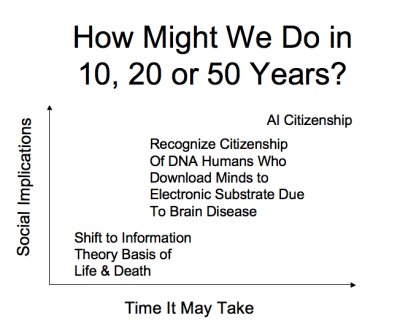Forms of Transhuman Persons and the Importance of Prior Resolution of Relevant Law
Martine Rothblatt, J.D., Ph.D.
page 5 of 5
Evolving Technology, Evolving Law
If it seems as though making the leap to believe in the possibilities of transhuman persons is too great, remember that in 1958, it was just as big a leap to cast aside the concept of national  sovereignty being based from the core of the earth and reaching in a cone out into space and replace it with the idea that national sovereignty ending at some point. Law must evolve with evolving technology.
sovereignty being based from the core of the earth and reaching in a cone out into space and replace it with the idea that national sovereignty ending at some point. Law must evolve with evolving technology.
Copernicus’ theory of the earth’s rotation numbered the days of old-school sovereignty. The notion of sovereignty sweeping out to the cosmos in a fixed cone is rendered irrelevant when we accept that the earth is rotating on an axis because everybody’s cone would sweep the same sectors of cosmic space. Going all the way back to Copernicus, the legal artifice of national sovereignty was already becoming illogical.
In the very same way, Turing’s theory of machine consciousness has begun to number the days of old-school citizenship. Turing asked, what if you could converse with a machine and you couldn’t tell the difference between conversing with a machine and conversing with a person? Is not that machine as conscious as the person? If we don’t evolve law with evolving technology, we will face conflicts of dysfunctional law.
The founders of space law did their best to avoid space conflict (between the US and the Soviet Union in particular) over conflicts of law. Today, we are not at risk for a war with Russia over transhuman rights, but could there be a war between humans and transhumans, between flesh and electronic substrate? That’s certainly a common theme of dystopic[1] science fiction plots and it is something that we can avoid with prior legal development.
How might we do in ten, twenty or fifty years? Image 8 depicts some possibilities.

Image 8
Certainly, the bigger challenge we undertake, the longer it will take. A shift to an information theory basis of death is not that big of a change. We just recently made a big leap in the past century from heart death to brain death. So perhaps this is not that big of a leap. It may take a relatively short period of time. At the other end of the spectrum is unifying artificial intelligence and citizenship, which might be a pretty big leap for society to take and may take quite a bit longer. The time to start the dialogue is now.
Footnote (back to top)
1. DYSTOPIA (dystopic): An imagined universe (usually the future of our own world) in which a worst-case scenario is explored; the opposite of utopia. http://en.wikipedia.org/wiki/Dystopia(March 3, 2006 11:52 A.M. EST)
 Martine Rothblatt started the satellite vehicle tracking and satellite radio industries and is the Chairman of United Therapeutics, a biotechnology company. She is also the founder of Terasem Movement, Inc..
Martine Rothblatt started the satellite vehicle tracking and satellite radio industries and is the Chairman of United Therapeutics, a biotechnology company. She is also the founder of Terasem Movement, Inc..